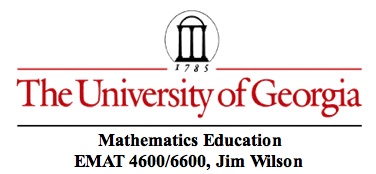

Getting started
Suppose one had 100 yards of fencing to enclose a garden.
What shapes could be enclosed? Suggestions:rectangles
squares
triangles
trapezoids
parallelograms
general quadrilaterals
regular hexagons
regular octagons
circle
semicircle
quarter circle
sector of a circle
What are the dimensions of each proposed shape and what is its area?
Make area charts for those figures where different dimensions of the 100 yard perimeter are possible.
Make scale models of the different shapes using a loops of string all of the same length. Compare the areas visually.
Rectangles
What rectangular regions could be enclosed? Areas?
Triangles
What triangular region with P = 100 has the most area?
Hint: Construct a table areas of isosceles triangles for base lengths from 2 to 48. Make a graph.
Use the AM-GM Inequality to prove the maximum area of a triangle with a fixed perimeter is the equilateral triangle.
Find all five triangular regions with P = 100 having integer sides and integer area. (such as 29, 29, 42)
Other Regular Polygons
What is the area of a regular hexagon with P = 100?
What is the area of a regular octagon with P = 100?
What is the area of a regular n-gon with P = 100?
What if part of the fencing is used to build a partition perpendicular to a side?
Consider a rectangular regionwith one partition?
with 2 partitions?
with n partitions?
What is the maximum area of a sector of a circle with P = 100?
Hint
Areas Fence Along a Natural Boundary
What about regions built along a natural boundary? The length along the natural boundary is not part of the amount of fence that needs to be used. For example, prove that the maximum for both a rectangular region and a triangular region built along a natural boundary with 100 yards of fencing is 1250 sq. yds.

But, the rectangle is not the maximum area four-sided figure that can be built. What is the maximum area of a four-sided figure where three sides are formed by the fencing and one side by the natural boundary?
Other situations
Return to EMAT 6600 Page